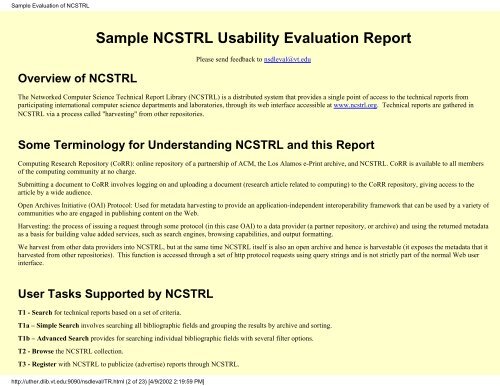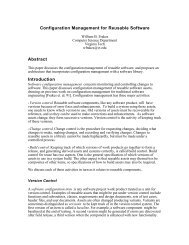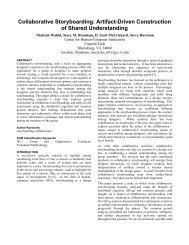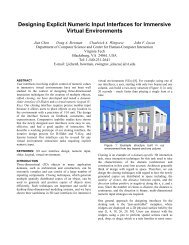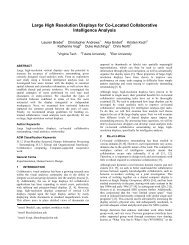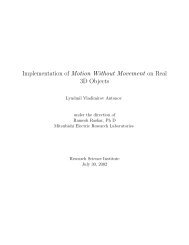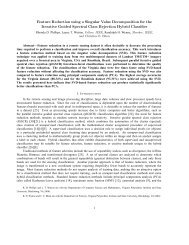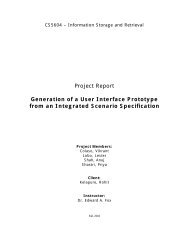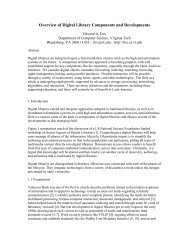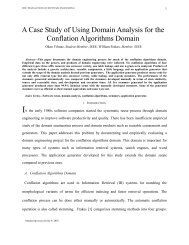Sample Evaluation of NCSTRL - Computer Science Technical Reports
Sample Evaluation of NCSTRL - Computer Science Technical Reports
Sample Evaluation of NCSTRL - Computer Science Technical Reports
Create successful ePaper yourself
Turn your PDF publications into a flip-book with our unique Google optimized e-Paper software.
<strong>Sample</strong> <strong>Evaluation</strong> <strong>of</strong> <strong>NCSTRL</strong>Overview <strong>of</strong> <strong>NCSTRL</strong><strong>Sample</strong> <strong>NCSTRL</strong> Usability <strong>Evaluation</strong> ReportPlease send feedback to nsdleval@vt.eduThe Networked <strong>Computer</strong> <strong>Science</strong> <strong>Technical</strong> Report Library (<strong>NCSTRL</strong>) is a distributed system that provides a single point <strong>of</strong> access to the technical reports fromparticipating international computer science departments and laboratories, through its web interface accessible at www.ncstrl.org. <strong>Technical</strong> reports are gathered in<strong>NCSTRL</strong> via a process called "harvesting" from other repositories.Some Terminology for Understanding <strong>NCSTRL</strong> and this ReportComputing Research Repository (CoRR): online repository <strong>of</strong> a partnership <strong>of</strong> ACM, the Los Alamos e-Print archive, and <strong>NCSTRL</strong>. CoRR is available to all members<strong>of</strong> the computing community at no charge.Submitting a document to CoRR involves logging on and uploading a document (research article related to computing) to the CoRR repository, giving access to thearticle by a wide audience.Open Archives Initiative (OAI) Protocol: Used for metadata harvesting to provide an application-independent interoperability framework that can be used by a variety <strong>of</strong>communities who are engaged in publishing content on the Web.Harvesting: the process <strong>of</strong> issuing a request through some protocol (in this case OAI) to a data provider (a partner repository, or archive) and using the returned metadataas a basis for building value added services, such as search engines, browsing capabilities, and output formatting.We harvest from other data providers into <strong>NCSTRL</strong>, but at the same time <strong>NCSTRL</strong> itself is also an open archive and hence is harvestable (it exposes the metadata that itharvested from other repositories). This function is accessed through a set <strong>of</strong> http protocol requests using query strings and is not strictly part <strong>of</strong> the normal Web userinterface.User Tasks Supported by <strong>NCSTRL</strong>T1 - Search for technical reports based on a set <strong>of</strong> criteria.T1a – Simple Search involves searching all bibliographic fields and grouping the results by archive and sorting.T1b – Advanced Search provides for searching individual bibliographic fields with several filter options.T2 - Browse the <strong>NCSTRL</strong> collection.T3 - Register with <strong>NCSTRL</strong> to publicize (advertise) reports through <strong>NCSTRL</strong>.http://uther.dlib.vt.edu:9090/nsdleval/TR.html (2 <strong>of</strong> 23) [4/9/2002 2:19:59 PM]


